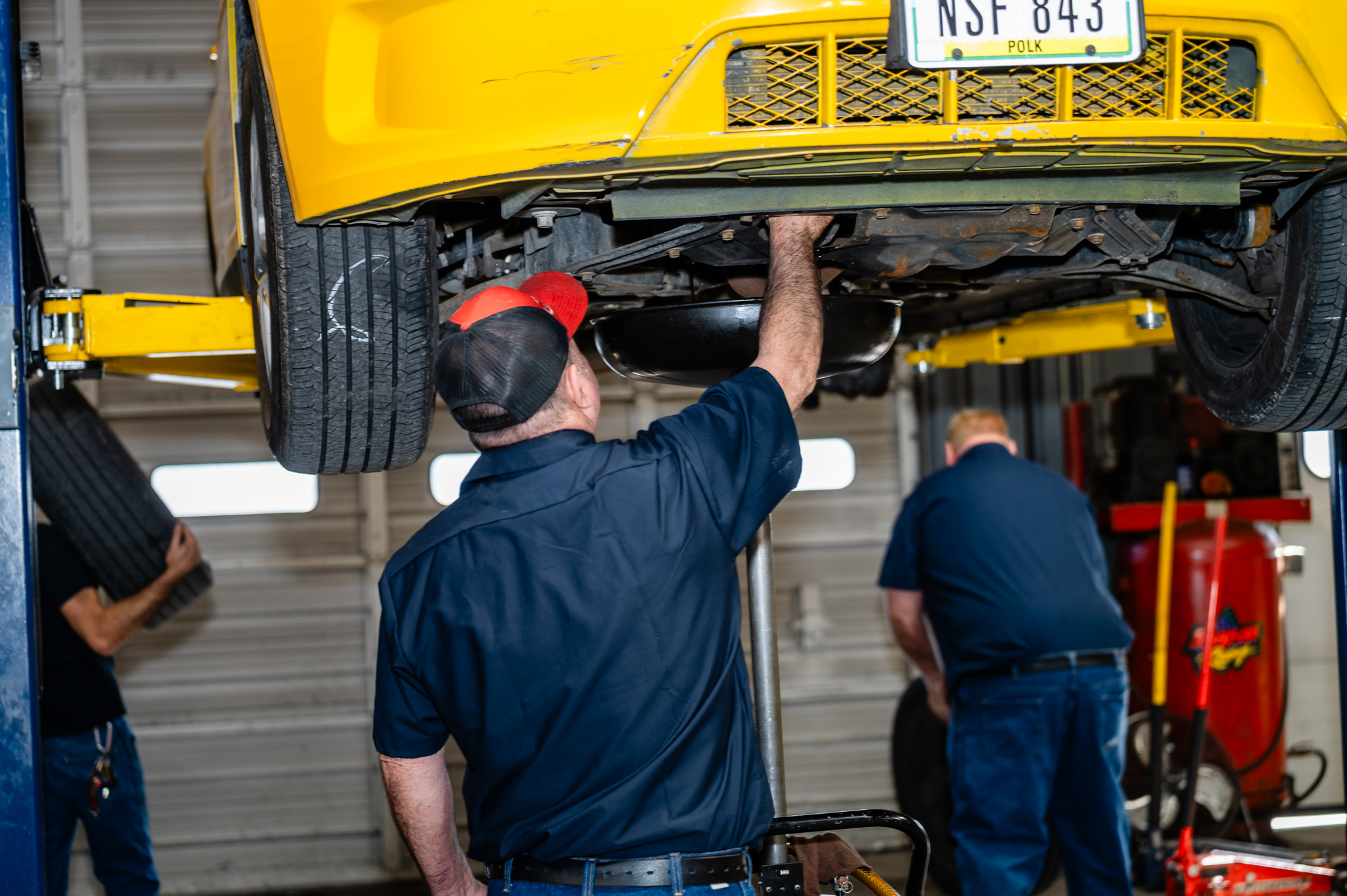Brakes are responsible for slowing your vehicle down and stopping your car safely. They are a vital component of your vehicle, operating through a complex yet seamless interplay of parts. Over time, brake components such as pads, rotors, and calipers wear out, necessitating repair or replacement.
Understanding the basic elements of brake repair will help you communicate effectively with service providers and ensure you’re getting the correct service. A firm grasp of these elements also enables you to detect early signs of wear and tear, thus preventing more severe issues down the line. At YCC Tire and Auto, we want to empower our clients with the best information to guide their auto decisions. Keep reading to learn more!
Key Takeaways of Our Essential Brake Repair Services
- Understanding the basics of your brake system—brake pads, rotors, calipers, and fluid—can help you catch early warning signs and make informed decisions when it’s time for repair or maintenance.
- Prioritizing regular brake check-ups not only saves you money but also ensures your vehicle stops safely when it matters most.
- Trust a transparent, knowledgeable provider like Your Car Care Tire and Auto in Des Moines to keep your brakes in top condition.
Key Components of a Brake System
Your brake system is your car’s most critical safety feature. Understanding the main components of your brake system is crucial for a few key reasons—especially when it comes to safety and maintenance.
Brake Pads
These are the components that press against the brake rotors to create friction and slow your vehicle. They need regular inspection and replacement to prevent damage to other parts of the brake system.
Why is brake pad maintenance important? Overlooking worn-out brake pads can lead to other issues, such as rotor damage, which is more expensive to fix. Understanding the wear indicators on brake pads can also serve as a proactive measure to maintain your vehicle’s braking efficiency.
Brake Rotors
Also known as brake discs, these are the surfaces that brake pads clamp down on to stop the wheels. Over time, rotors can become warped or worn, affecting braking performance.
Why is brake rotor maintenance important? Regular resurfacing and inspection can extend the life of your rotors, ensuring optimal braking performance. Additionally, knowing when to replace vs. resurface rotors can save you money and improve safety.
Calipers
These components house the brake pads and use hydraulic pressure to press them against the rotors. Calipers are crucial for applying brake pressure, and any malfunctions can lead to uneven braking or total brake failure.
Why are caliper check-ups important? Regular checks for leaks or sticking calipers can prevent such failures and maintain brake efficiency.
Brake Fluid
This hydraulic fluid transfers force into pressure, amplifying braking force. Maintaining proper fluid levels is essential for effective braking. Additionally, regular fluid flushes can prevent moisture buildup, leading to brake line corrosion and reduced braking effectiveness.
Why are brake fluid check-ups important? Understanding the signs of brake fluid degradation, such as discoloration, can help you maintain the optimal condition of your braking system.
Signs You Need Brake Repair
Understanding the signs of brake wear can help you address issues before they become more serious. Look out for:
- Squeaking or Squealing Noises: These sounds often indicate worn-out brake pads. Ignoring these noises can lead to further damage, such as rotor wear, which is more costly to repair. Regular checks and timely pad replacements can prevent this progression.
- Grinding Noise: A grinding noise usually means the pads are completely worn down, and the metal is rubbing against the rotor. This situation requires immediate attention to avoid rotor damage and ensure safe braking. Recognizing this sign early can save you from more extensive repairs.
- Vibration or Pulsation: If you feel a vibration when braking, it could be due to warped rotors. This can affect braking efficiency and vehicle control, particularly during emergency stops. Addressing this issue promptly can improve your vehicle’s safety and performance.
- Soft or Spongy Brake Pedal: This might indicate air in the brake lines or a problem with the brake fluid. A spongy brake pedal compromises your braking ability, increasing stopping distances. Regular brake fluid checks and system bleeding can maintain pedal firmness and braking efficiency.
The Importance of Regular Brake Maintenance
Regular maintenance not only prolongs the lifespan of your brakes but also ensures your safety on the road. Here’s why regular check-ups are crucial:
Preventing Costly Repairs
Routine inspections can identify minor issues before they escalate into major, costly repairs. By addressing wear and tear early, you can save money and prevent damage to other brake components. Regular maintenance also helps optimize the performance of your vehicle’s entire braking system. Proactive care is often less expensive and less time-consuming than dealing with emergency repairs.
Enhancing Vehicle Safety
Your brakes are your vehicle’s primary safety system. Regular maintenance ensures they function correctly, reducing the risk of accidents due to brake failure. Consistent brake checks can ensure that your vehicle stops as expected, providing peace of mind while driving. Well-functioning brakes are essential in both daily driving and emergency scenarios where split-second stopping can prevent collisions.
Improving Performance
Well-maintained brakes enhance your vehicle’s performance, providing smoother and more reliable stopping power. This is especially important in emergency situations where quick stopping is essential. Regular maintenance also improves the overall driving experience, offering better pedal response and more efficient braking. You can also enhance fuel efficiency by maintaining optimal brake performance—properly functioning brakes reduce drag.
Choosing the Right Brake Repair Service in Des Moines
Selecting a reliable brake repair service is essential for ensuring quality work and maintaining vehicle safety. At Your Car Care Tire and Auto, our technicians are trained and certified to complete brake repairs, replacements, and other services. Here’s what to expect from our Des Moines auto shop:
Friendly and Experienced Staff: Our technicians stay updated on the latest brake technologies and repair techniques, ensuring your vehicle receives top-notch care. We are always willing to answer your questions and provide honest, professional recommendations.
Detailed Estimates: We provide itemized estimates that break down the costs of parts and labor. This process helps you understand where your money is going and fosters trust in our services. Our detailed estimates prevent surprises and ensure that you are fully aware of what you’re paying for.
Transparency: Transparency is key to building long-term customer relationships. We do our best to avoid technical jargon and explain brake repair concepts in plain language. Clear communication reduces misunderstandings. We want you to feel confident in your decisions.
Ongoing Communication: We do our best to keep customers informed about the progress of their repairs. Regular updates and clear communication helps alleviate concerns and demonstrates our dedication to customer service.
Reliable Brake Repair in Des Moines
Brake repair is essential to vehicle maintenance, and understanding its intricacies empowers you to make informed decisions. By choosing a reliable brake repair service like Your Car Care Tire and Auto in Des Moines, you can feel confident in your vehicle’s safety. Contact your local Des Moines auto experts today.
FAQ About Brake Repair in Des Moines
Q: How often should I have my brakes inspected?
A: We recommend a brake inspection at least once a year or every 12,000 miles—whichever comes first. But if you notice unusual sounds, vibrations, or decreased braking power, it’s best to schedule an inspection immediately.
Q: What’s the average lifespan of brake pads?
A: Most brake pads last between 30,000 and 70,000 miles, depending on your driving habits, environment, and the type of brake pads used. City driving with frequent stops can wear pads down faster.
Q: Can I just replace the brake pads without resurfacing or replacing the rotors?
A: Sometimes, yes. If the rotors are still within manufacturer specs and aren’t warped or damaged, resurfacing or reusing them is possible. However, badly worn or uneven rotors may require replacement to ensure safe and smooth braking.
Q: What causes brake fluid to go bad?
A: Brake fluid can absorb moisture over time, which leads to corrosion and reduced braking efficiency. Heat, air exposure, and contamination also contribute to degradation. A brake fluid flush is generally recommended every 2 years.
Q: Why does my brake pedal feel soft or spongy?
A: A soft brake pedal typically points to air in the brake lines or low brake fluid levels—both of which can compromise stopping power. This issue should be addressed immediately by a qualified technician.
Q: What sets Your Car Care apart from other brake repair shops in Des Moines?
A: At Your Car Care Tire and Auto, we prioritize transparency, detailed communication, and professional service. Our certified technicians provide honest assessments, itemized estimates, and friendly support to keep you safe on the road without upselling unnecessary repairs.

